Parcels: Riding the wave
Fresh off the Australian swing of their tour for their self titled debut album, Parcels members Jules Crommelin (guitar) and Patrick Hetherington (keys) reflect on the ride their first full length body of work has taken them on. We chatted to the two guys in Melbourne, and despite the scorching summer day, were able to get into the nitty gritty details of ‘Parcels.’
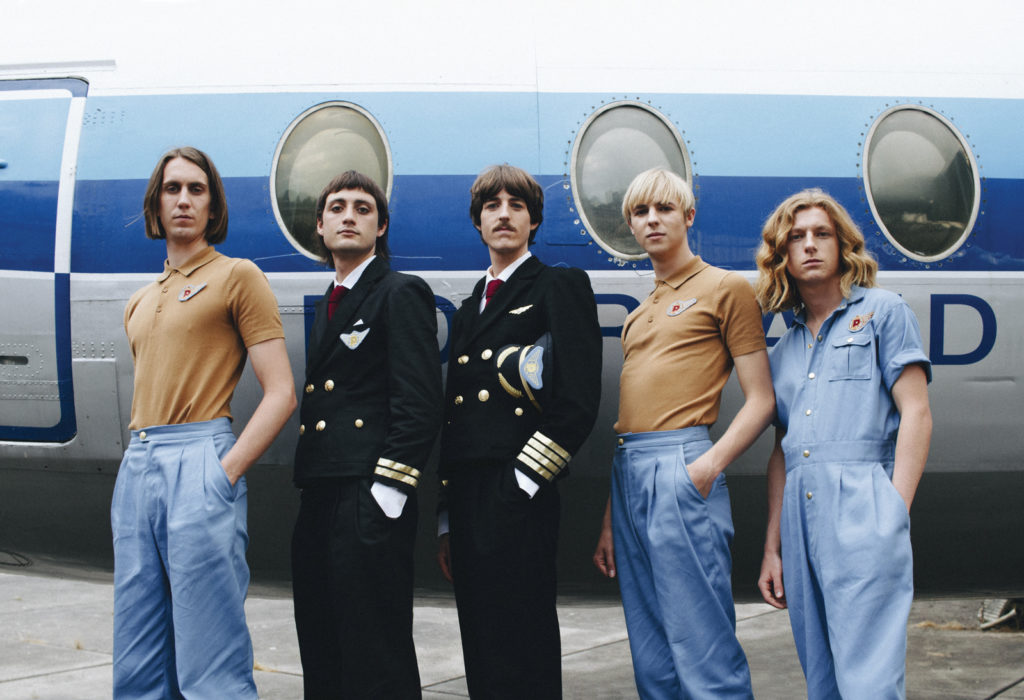
A forty degree Melbourne afternoon won’t stop Parcels from shedding light on the innermost details surrounding their first ever album. Whilst Patrick and Jules have a different outlook on Melbourne’s ‘alarmingly hot’ weather, with Patrick being more receptive, liking ‘the dryness and the cityscape’, their view on their brand on music is more in unison.
A1on1: I wanted to congratulate you on the album and the praise coming your way.
I’m curious, because of the cohesion of the album, at the beginning, were you aware that you were sitting down, in the process of or was it that you had a collection of songs and then decided that it’s ready to collate?
Jules Crommelin: We did kind of go, let’s start on the album. We were touring, and we had this little spot where we could start writing and it was all kind of prepared. We did that, but that’s as structured as it was. [We] started writing music and then it just kind of went every which way and somehow it just fit together. That was something that came after. I feel like it all continued naturally whilst writing but it’s a bit of a task putting it all together.
What kind of statement was the aesthetic of the ‘travel’ and ‘planes’ and ‘flying’ themes trying to make for the sonics and lyrics?
Patrick Hetherington: The aesthetic around the album followed after we had all the music finished. We worked closely with Jules’ sister who been working with us on all our aesthetics to come up with a concept that followed the music. The idea of travel and movement is something we had from the start in the band, somehow. It’s something we’ve gone back to again and again just naturally, so that felt really good. It was about the iconography of the plane and the togetherness of the crew.
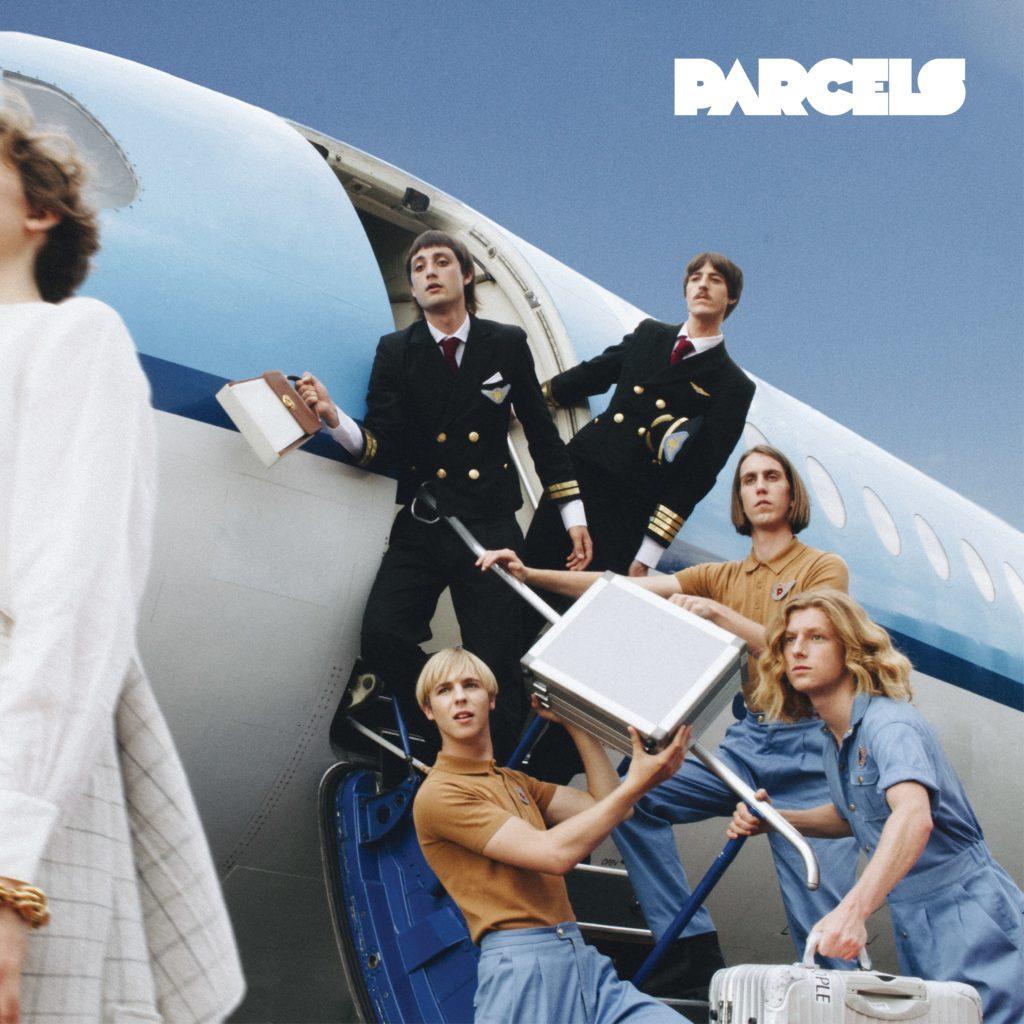
Sonically, Parcels excels in their delivery. Their experimentation and eclecticism was proficiently nuanced and subtle.
What was the process like in experimenting, or was there any points where you felt you dived the deepest you ever have?
JC: It’s interesting, because we really wanted to make an album that was diverse and every time we were experimenting on something new and [seeing] a new pathway, it felt really so out of this world different compared to what we were doing before. We were like ‘wow’ maybe this is a bit too much and it’s going to freak people out, but let’s go there, but in retrospect it’s just going a little bit one way [not as drastic]. It’s probably just the process, how we bring it all together. We’re very adamant on arrangement and using instruments that we can play and will play live, and that brings it back [to not being too outlandish] in a way.
So, the flute and the strings, were they played by you?
JC: They were two examples where we were like, ‘wow, I can’t believe we’re going to do that. Should we? Probably not, but let’s do it.’ It was super fun, and in the end it’s just a little detail.
Then relinquishing control wasn’t a fear of yours? That you weren’t the ones playing those instruments?
PH: We can’t play those instruments sadly. But, we brought in really cool musicians and we worked with them in the studio. We wrote all the parts and produced them whilst they were in the group and we were able to guide it.
So still really collaborative?
PH: Yeah. We had an idea of where we wanted to go, and then always the individual player brings something new.
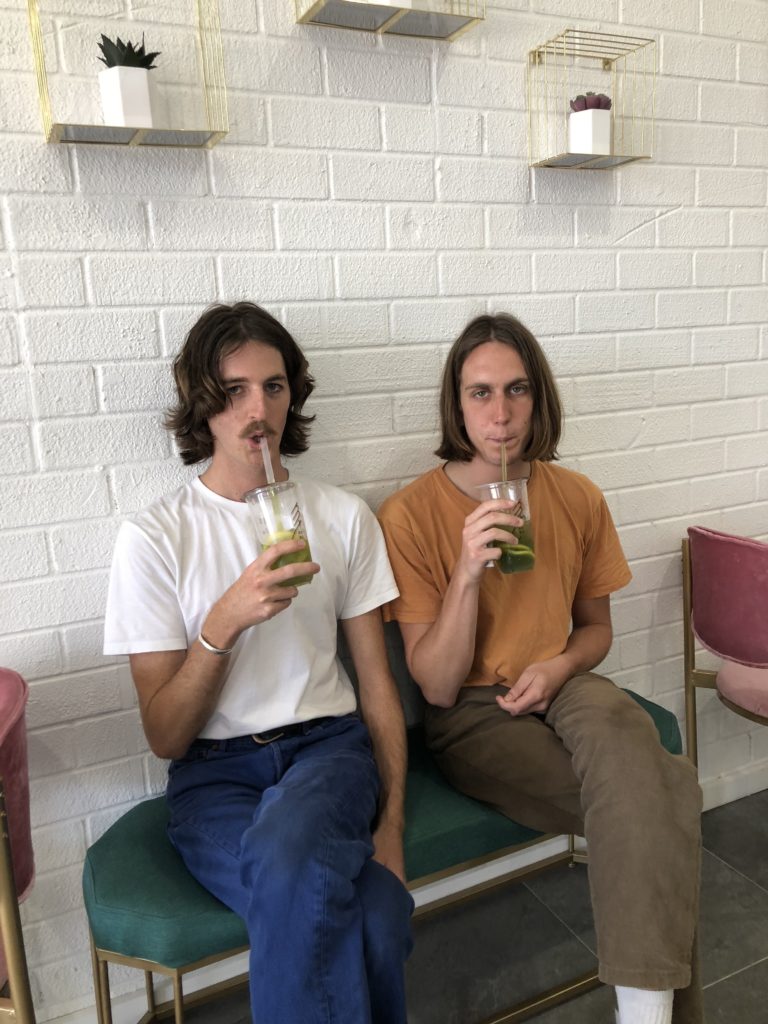
For a short time, we were briefly interrupted, with the two muddling up which straw belongs to whom for their juice orders. However, through the power of collaboration aforementioned, we were able to get back on track.
What other challenges do you think you encountered and how did the dynamic as a group help you get past that?
JC: I can think of one challenge for me. I remember early on, I’d write like a slow, folky song and then I’d be like ‘nope, none of that. Let’s write a pop, well not a pop song, but a dance song.’ I really was inspired to make a really groovy album and make it dancey, so I would go to town on making some sort of instrumental rhythm section and then I would go to sing over the top and go oh ‘wow I can’t do this. I can’t actually get to that spot I want to go with my voice.’
I would kind of have to just throw it all away because it wasn’t for my voice, so that was a challenge. The thing that helps is when we all come together, and we sing together and that actually brings the strength and gives that sound. We all sing kind of quietly but all together it’s actually got some punch, so that helped.
Upon formation, Parcels made the bold, courageous decision to relocate from Byron Bay and base themselves out of Berlin. I wanted to explore with them the experience of being in a different physical surrounding.
How did independence, isolation and freedom shape the way the album’s sonics and lyrics?
PH: That’s a tough one. Obviously, the lyrics come from the experience we had through the years living there, most of it.
JC: It definitely shapes the album in some way. Yeah, the place where we are is relative to that shaping.
PH: At the same time as well, it’s not the biggest [factor]. I would be interested on what kind of album we made if we were living here and how different it would be. It’s hard to say.
JC: I mean, relationships are the biggest thing that we talk about and I think they’re the most important things in life, relationships and connections with other people. There was certainly a lack of that, so maybe that was a part of the album in a way. You end up writing about that because you don’t have it in your life.
Do you think that in ‘Yourfault’, the bushy sound at the end and the beachy sounds in ‘Tape’ are a product of what you crave?
PH: Yeah, I think that’s a fair analysis of it. We have that beach inside of us. It’s really fun to be in Berlin and to look at that. It makes it more exciting to make a really surfy section. It feels more unexpected and I don’t know if we could do that if we were in Byron; it’d feel a bit obvious.
JC: I think we would end up having more of a European sound if we were [making music] from Australia, coz you’re always looking on the other side, going that looks cool.
As we chat, we delve into whether they instantly notice this manifestation or whether it only comes about in hindsight.
JC: It’s all subconscious, definitely. We really got into exotica music, and it’s exactly that. It’s like tropical music. We didn’t put two and two together.
PH: That’s really interesting. There’s so many things you learn about yourself when you listen to your music later. Also, lyrically.
Do you like listening back to it? Does it feel like a diary, getting to look back at it in time?
JC: I have that with ‘Hideout’ now. I can look back and go ‘wow,’ I listen to it and it sounds strange. Like that was a while ago and I’ve changed you know? Which is cool.
PH: I think it takes a bit more time before the album does that and to understand.
JC: [Listening back to the album] just annoys me because it’s just a little bit too there and you still think of things you could’ve done better, but we’ll get there.
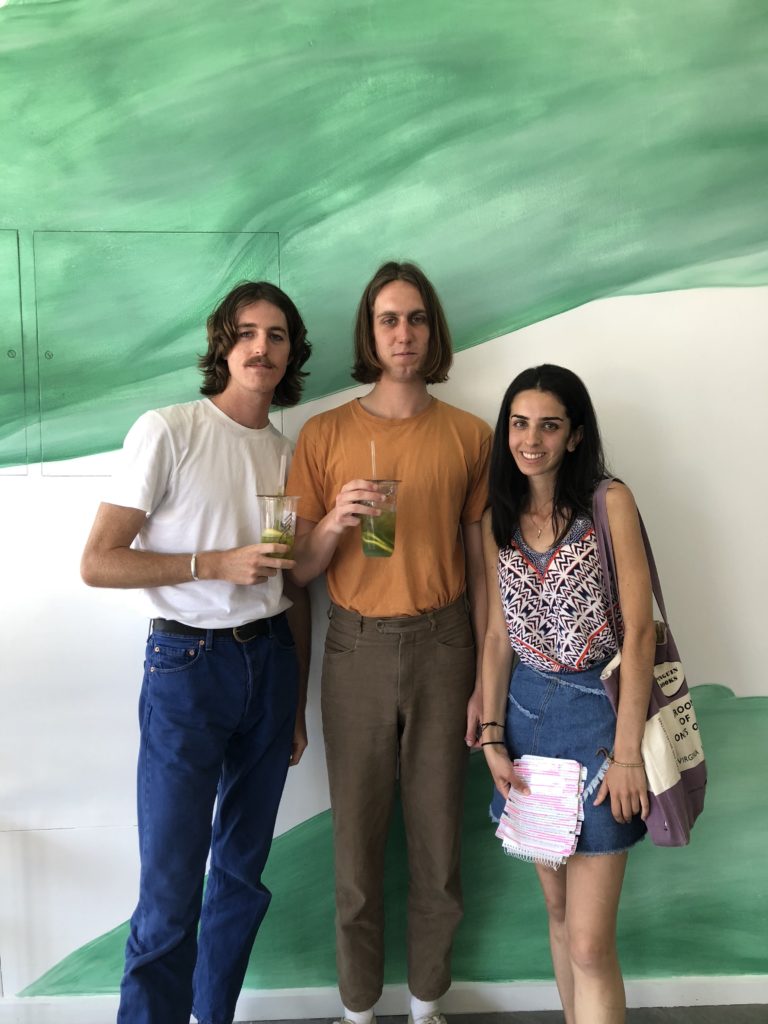
The guys are passionately pro 70’s and exotica influences, something that is evidently injected into their debut project. I also ask them about their storytelling influences in ‘Tape’ and in ‘Bemyself’, and they shared how this also comes to them through sounds and music.
PH: I would say the storytelling is more in the music not the lyrics. It’s very hard to write lyrics over this kind of music that is linear in a story form. It’s more of an introspective, momentary thing, grasping it; it’s a bit more abstract. There’s definitely stories in all the music. They seem to have a very natural electricity. That’s kind of what happens when we work together more, we get a song and we follow where it feels like it needs to go. It always ends up on a journey. That’s kind of what we’ve always had since the start of playing together.
JC: I really love making journey’s instrumentally too. I used to be really into progressive music. We all love Pink Floyd and how they can go from one place to another. That’s so exciting to make that happen. It’s like making a painting, you know and changing colour.
That’s interesting. I saw that in songs like in ‘Everyroad’, you’re telling a progressive story, but you still collapse that model in a way.
There’s hopefulness at the beginning and towards the end that crashes and your thoughts take over. Can you talk about those moments and if you ever thought you were veering away too much?
JC: That thought was shunned out of the room always. When anybody said that ‘we’d be like shut up.’ That’s the last thing you want to think about when you’re writing music. You want a complete open canvas. It’s not about bringing it all back, because that’s not what we want to do. The whole essence of Parcels is just that we want to make music and follow our inspiration. That was the statement of the album in a way. Although it kind of sounds coherent, we didn’t want that really at the start.
PH: It’s really inspiring. We must’ve talked about it before getting into the album, but we can’t try and make a ‘Parcels song’ sound like one specific thing. I just remember when we started writing demos and working, I felt the most liberating feeling I’ve had with the band thus far because I knew I could just try anything and wouldn’t get judgement. It doesn’t matter and that was the best feeling.
Would you say being restrictive and limiting your craft to what ‘Parcels would make’ compromises authenticity?
JC: Yeah! I think that happens with every musician, every genre and every band. Pop music is a great example of that. It all starts to sound the same because they all subconsciously think that if they get out of that, it’s not going to work.
As the conversation progresses, it’s clear that Parcels have a strong association to sonics and mastering the art of sounds. We talk about the direction of their lyricism and how it moulds itself to the sonic arrangements.
Some songs cemented themselves on the album as lyrically driven, like ‘Withorwithout’, whilst others really stood their ground sonically. Did you want a balance between the two or was it just natural progression?
PH: Again, I think you just have to follow the mood of the song. We never really thought about that so much. I don’t know, we never tried to put the lyrics at the forefront of the song. The lyrics would usually come from one person and we would go through them and decide they were cool and that would be that. Then we would just try and make the song work in its own right.
JC: Yeah, I think naturally some songs the lyrics come out more and you build the arrangement about putting that to the forefront. I think subconsciously if it’s not that, then you start building the instrumental over the top of that which is interesting.
Like trying to cover up or fill in the gaps?
JC: Which is not necessarily a bad thing, because not every song has to be about lyrics, or melody. It can be a melody on a guitar and that can be just as cool. We’re always trying to put something at the front, but what that is, sometimes is hard to understand straight away. You might think it’s the melody of the voice, but maybe it’s something else.
The way the tracks each naturally have a centrepiece creates a heightened listenability. It’s something easy to listen to with your mates for a good time, but also to dissect when feeling more vulnerable.
Can you talk about creating two sorts of communities? Is that something you gravitate to in music?
PH: That makes a lot of sense, because that’s how we make the songs. It starts off with just one of us in our bedroom alone, and the lyrics usually come from a personal, often lonely and introspective place. Then, we bring it together and have a lot of fun making it in a group. It’s like how those two things come together.
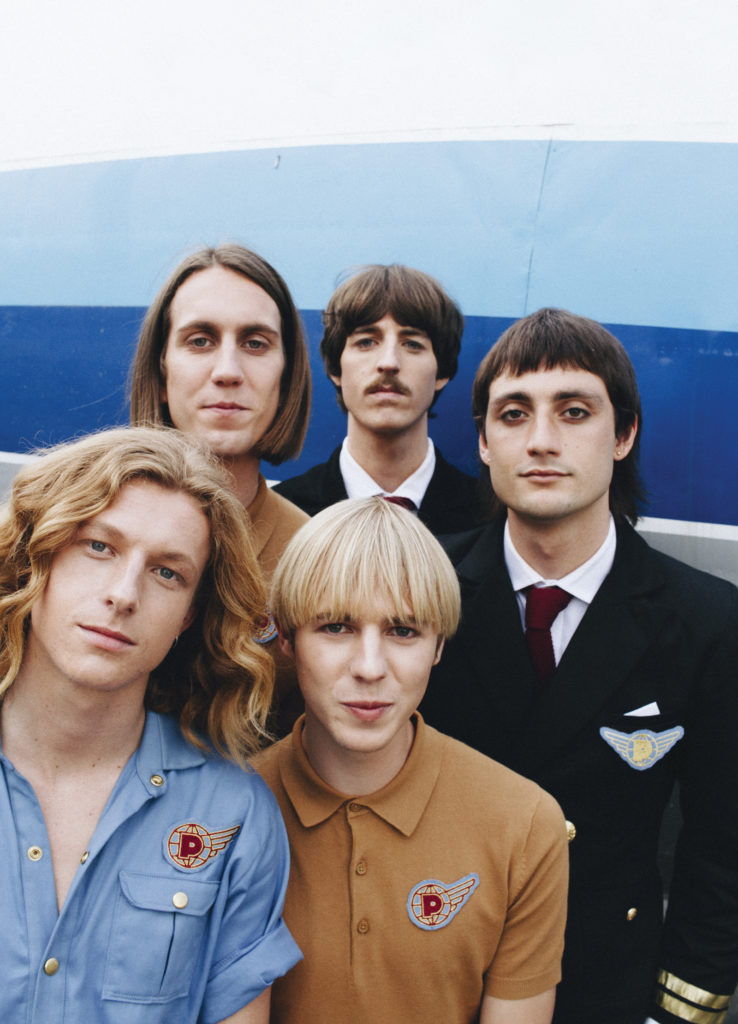
Lastly, I want to ask, has tour helped you see the universality of your brand of music? What has the reception been like?
JC: Yeah, every crowd and country have a different vibe. We certainly find out which songs don’t work and then we don’t play them, or we change it and work it out to make it better, hopefully. We’re definitely very stoked to see that universally, in the Parcels fanbase everyone comes and has a good time when we play live. There’s moments where the crowd also just listens and settles down too. We want a whole bunch of that in our set, not just a dance party.
When you talk about songs not working so well, is that disheartening? How do you improve those songs without completely erasing them if you like them as a band?
PH: It can be tough. There’s usually a way. We always sense when a song’s not working well. If we want to play that song, we take it back and rehearse and we work on it, work on it, work on it. Sometimes it can be the tiniest thing. Like, playing ‘Exotica’ live was really hard at the start. We changed things very minimally, we added a little bit of keyboard and tambourine on the snare, little things to make the groove right, and now it feels really nice. It’s just about unlocking the little pieces to make it work.
JC: It can also be really subtle which is really interesting.
PH: And also, about our confidence and how we feel. If we don’t feel confident about playing, especially a soft song, it’s easy to lose the connection with the crowd and each other because we’re nervous. We need to be fully in the moment to get that across.
Where do you see yourself in this brand of music and within the crossroads of older funk and modern music?
JC: I definitely see us moving all the time. But, there will always be some sort of foundation in Parcels because it’s us five in the band and we’re singing. I think we’re always going to be singing together and that’s all we need to think about. We’re just free in every other aspect. I don’t know where we’re going next!
PH: Again, we can’t decide, just have to see what comes. That’s kind of the point.
JC: That’s the exciting part for us. Waiting till you get inspired by something and going with it.
PH: I can’t wait for that.
If one thing is clear, it’s that Parcels is just preparing for take-off. There’s an unexplainable aura of cohesion between the group, and they’re all ready to co-pilot themselves to bigger and better destinations.
‘Parcels’ is available to stream and purchase everywhere now.
Follow Parcels here: